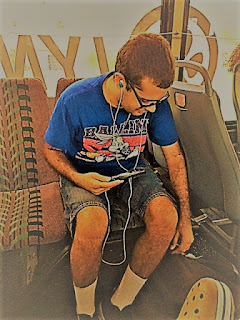For the last couple of years of my supposed retirement I
have taught ethics as an adjunct at the local state (née community) college.
Truth be told, my business with teaching simply was not finished in 2015 even
as I had felt the need to escape the university with my sanity and what was
left of my dignity. I had come to the university from the Osceola Campus
of Valencia in 2001. At a very basic level, it was like coming home to return
to teaching there.
Transit Trade-offs
After my first few weeks as an adjunct commuting to work, I
calculated that between my planning time, grading time and commute time - in
addition to my actual time on campus - I
was making just above minimum wage. Between tolls and mileage to the Osceola
Campus alone, I was paying nearly $17 each way just to get there.
So I began riding the local transit system bus to work. It
was a long ride, about an hour and 10 minutes on a good day, one way, this
after a 15 minute drive to the bus stop along the route to the college,
catching the bus in front of a grocery store where I left my car each morning.
It was a hassle on a good day. The bus was as often late as
not. Because it only ran every hour, I always gave myself plenty of leave time
prior to scheduled departure. That meant I waited most mornings 10-15 minutes.
But it also gave me some breathing room when the bus ran late so I wasn’t late to
my class. Some days it rained and at my stop – like most stops - there was not
even a bench to sit on, much less a shelter.
So, who really cares about working class people, anyway,
right?
But the bus ride allowed me time on the way down to the
college to catch up on the news, to check to see if it would be raining when it
came time to catch the bus home that afternoon or to read the latest dystopian
science fiction novel on my Kindle. I used the time on the way home each evening
to grade papers.
The second year of my commute, the bus became free for
college students and staff. I could hardly get a better deal. No one was going
to pay me to ride.
While the use of local transit came at a cost of time and
convenience, it had other payoffs which are hard to reduce to the dollars and
cents that market fundamentalism insists that all aspects of life in a
consumerist culture be measured in. My car was not adding one more vehicle to
overcrowded local highways. It was not adding one more car’s worth of demands
for carbon fuels or dumping one more car’s worth of carbon exhaust into our
atmosphere.
There was much less wear and
tear on my aging Prius, a car this retiree hopes will last me indefinitely. I didn’t have
to worry about traffic along the way – much of which is under construction - or
parking once I arrived. Thus, I inevitably arrived a lot less stressed than
before.
Then there were the educational aspects.
Some days I simply sat on the bus and watched the parade of
humanity that passed by my seat. It was never dull. Living in a
majority/minority metropolitan area, the first thing one learns is that they
can never presume the person sitting next to them speaks English as their first
language. Then there was the lesson I learned as a professional middle class
man, that my life circumstances were rarely shared by the majority of the
people I encountered.
I called it the Margaret Mead Express. Because whatever
else you might say about that long ride, it was never dull. And it was always
informative.
Aware of My Privilege
The morning She appeared I found myself just sitting,
looking around the crowd. The bus was about half full and, as is often the case
at that late morning hour, fairly quiet. I noted that, as usual, many riders
wore the required polyester corporate uniforms enroute to or from work.
It was one of many moments that I was consciously aware of
my own privilege.
Perhaps it was the fact I had the luxury of spending my
transit time checking for last minute student messages on my course site using
my iPad which in turn had access to the bus’ wifi system. Or maybe it was the
fact I had a thermos of coffee I’d made at home with my favorite Cuban coffee
beans and soy milk from which I periodically took a clandestine swig (you’re
not supposed to eat or drink on the bus, for good reasons).
Then there was the fact my polo bore no corporate logo
declaring that the garment – if not the very soul of its bearer – were
ultimately the property of some corporate chain restaurant, hotel or managed health care
system.
Like many who sat around me, I, too, would be paid no
benefits nor a living wage by an employer who relied on part-time, minimally
paid workers to continue operating. But, unlike any of them, I had a meager state
pension paying me enough to keep the lights on and the beans on the table. And
I had a husband whose medical coverage through the same college toward which I
was headed to work which ensured treatment should I become injured or ill. Adjunct teaching for me was at some level a
luxury I could engage or not as I chose.
Few people on the bus that morning could make any of those
claims.
Because I had nothing pressing that morning, I was able to
stare out the windows at scenes of life passing outside my window. These were
working class neighborhoods with exotic sounding names: Sky Lake, Meadow Wood
Estates, Buenaventura Lakes. I would never live in neighborhoods like those, I
simply passed through them twice daily enroute to and from my job as a college
professor and wondered to myself what life was like in such a place.
(Brief Excursus: I love community/state colleges. Every teacher
is called “professor” there out of respect - including adjuncts like myself.
Neither the students nor the staff have the time or the need to play the
inflated ego games of hierarchy or status that is second nature at
universities. If you’re standing in front of the class, your title is
professor.)
She Looked Exhausted
This day promised to be challenging at the college. It was
the day we covered the ethics of punishment. Who punishes whom and why was one
topic that always managed to engage students, some of whom would have already
experienced the “justice system” first hand. I sat pondering how I would try to
explain concepts like deterrence theory and its many failings and restorative
justice and its largely unrealized promise.
That was the moment She came staggering down the aisle. And
at that moment, the world seemed to grind to a complete halt.
She was a middle aged African-American woman. Overweight.
Graying hair flowing loose, unkempt. She looked exhausted, her eyes opened just
enough to negotiate her way down the aisle and up the stairs to the back of the
bus. Indeed, her appearance suggested that today was not an exception for her,
she had probably led a difficult life.
In another life she might have been a pillar of her
community, a respected source of wisdom at her local church and a valued voice
in its choir, famous for her chicken and dumplings at the Sunday potluck. This
day she wore the flimsiest of worn rubber thong sandals on her dirty feet. Her
dress was so sheer as to be diaphanous, more like ragged bed clothing than
daily public wear. Periodically her garments gaped open revealing large swollen
breasts which threatened to spill out unimpeded.
As she passed without making eye contact with any of us
that morning, I almost lost my breath. This was not the ordinary denizen of Bus
104. She fell into her seat at the very rear of the bus with a loud sigh,
dropping into a semi-coma almost immediately.
As I looked around me, for at least a brief moment,
everyone there seemed to recognize that something unusual had just happened.
Then, just as quickly, they went back to their previous activities.
Perhaps some of them wondered about her as I did. What had
brought this woman to this place this day in this condition? Had she had a long
night? Was she running from abuse? Had she just scored whatever cheap street
drug that was available to temporarily escape the hell that was her life? Was
she mentally well? How in the world did she end up here, looking like this?
Heaven only knew. And this morning, heaven wasn’t about to
tell.
Just Trying to Get By
But she didn’t care. Soon loudly snoring, she was oblivious
to the fact she was nearly exposed here amidst a group of strangers.
Fortunately for her, few of them paid much attention.
Indeed, a number of them, too, were dead tired. Some were coming off night shifts at hotels, restaurants, hospitals, their bodies and dirty clothing smelling of a long hard day of labor, perhaps at more than one job site connected by even more bus rides.
Some listened to i-pods or distracted themselves with games on their cells. Some surreptitiously gobbled down cold remnants of their daily fast food meal, looking around to see if anyone noticed they were breaking the rules regarding food and beverages on the bus. Truth be told, no one really cared.
Others took clandestine swigs from cans of malt liquor poorly disguised by the tan paper bags issued them with the beer at the convenience store. For most of us, this would be the middle of an ordinary work day, hardly the time to be swilling down booze. But for these folks it was the end of their shifts and they were determined to take the edge off their bodily – if not existential - pain at the end of a long day.
It was a bus full of souls just trying to get by.
Not everyone was exhausted. Some wearing freshly washed
clothes and plastic name tags simply sat quietly awaiting their stops at the
Walmart, restaurants and convenience stores where they would spend their day.
Some elderly men with oversized fountain drinks from corner filling stations
carried on animated discussions in Spanish with people they knew sitting
several rows of seats away. Here and there students used the time on the bus to
get in last minute cramming before the algebra and biology tests they faced
upon arrival at the same destination I awaited.
Then there was the occasional professional middle class
worker like myself, a professor reading the last minute excuses from students who
would be avoiding that day’s classes. My guess is that most of my fellow
passengers figured I was there due to a DUI and suspension of my driving
privileges. Neither was true but I didn’t really care.
And neither did She.
In the back of the bus where I always sat, the snoring had
tapered off to a low hum. For a moment, she was at peace.
And Yet the Image Shines Through
Years ago, Joan Osborne made a hit record raising a
provocative question:
Just a slob like one of us.
Just a stranger on the bus trying to make his way home….”
(Joan Osborne, 1995)
What indeed.
As I observed this exhausted woman, her large breasts
spilling out of her sheer garment and heaving with each breath, collapsed now
across two seats, head against the rear window, calloused feet dangling into the aisle, a sudden
revelation came to me:
“Here is the image of G-d.”
Undignified.
Impoverished.
Socially unacceptable.
But nonetheless the divine image, shining brightly through
what Mother Theresa called “the distressing disguise of poverty,” for those
willing to look long enough to see it.
Here was one of the “little ones” that Jesus loved, one of the poor that
Jesus said G-d sees as blessed.
And for just that brief moment, I realized what an incredible
privilege I had been afforded to be present for that revelation.
+++++++++++++++++++++++++++++++++++++++++++++++++++++
Harry Scott Coverston
Orlando, Florida
If the unexamined life is not worth living, surely an
unexamined belief system, be it religious or political, is not worth holding.
Most things worth considering do not come in sound bites.
For what does G-d require of you but to do justice, and to
love kindness, and to walk humbly with your G-d? (Micah 6:8, Hebrew Scriptures)
Do not be daunted by the enormity of the world's grief. Do
justly, now. Love mercy, now. Walk humbly now. You are not obligated to
complete the work, but neither are you free to abandon it. - Rabbi Rami
Shapiro, Wisdom of the Jewish Sages (1993)
© Harry Coverston
2018
+++++++++++++++++++++++++++++++++++++++++++++++++++++


























